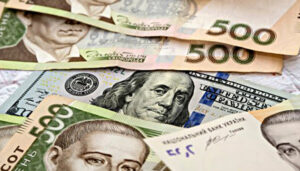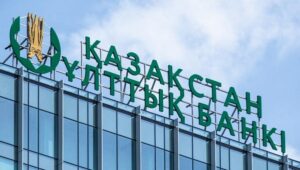
Russia’s full-scale invasion of Ukraine has virtually eliminated the demand for foreign currency loans, contributing to a reorientation to lending in the national currency, which is a good indicator for the economy, according to Pervin Dadashova, director of the NBU’s Financial Stability Department.
“Hryvnia lending prevails, and in general, in principle, the hryvnia is more attractive for lending than foreign currency. This is very important, and I think that this love for lending in hryvnia should continue,” she said at a discussion held by the Center for Economic Strategies (CES).
Dadashova noted that earlier the main motivation for foreign currency lending was lower interest rates on such loans, which led to problems in the absence of real needs and revenues in foreign currency. According to her, the risks of foreign currency lending, which increased during the war, have sharply reduced business interest in the dumb
The Director of the NBU’s Financial Stability Department noted that the loan portfolio has recently stabilized and returned to a slight increase, and now banks are faced with the task of compensating for its loss during the war, which, according to various metrics, amounted to about 15%.
“Now the quality of the loan portfolio is absolutely normal, it is even better than before the war. That is, banks are not losing as much credit risk as they did a few months ago,” the expert emphasized.
She clarified that the small growth in the loan portfolio so far is largely due to the growth under government support programs.
“However, a greater openness to new lending is already noticeable, including in our surveys,” Dadashova noted.
Among other trends, she noted an increase in the share of small and medium-sized businesses (SMEs) in the loan portfolio to more than 50%.
“A significant part of them belongs to business groups, so it is not a pure small business, it is still a big business, but it is structured in a certain way. But in the total portfolio, 15% of loans are granted to debtors who do not belong to business groups,” the expert said, emphasizing that they are a “good engine” for market lending.

The National Bank of Ukraine has fined Insurance Broker Grand Insur LLC (Odesa) UAH 51 thousand for violating the requirements in the field of financial monitoring.
According to the regulator’s website, the fine was imposed for violation of the requirements of clause 5, p. II of Regulation #140 and clauses 12, 13 of the Annex to Regulation #140 in terms of failure to submit reports to the National Bank on prevention and counteraction.

Starting from October 3, banks that have been able to buy and sell foreign currency at the request of their clients only within the official exchange rate of the National Bank of Ukraine +/- 1% may set it independently without this restriction.
The relevant provision is enshrined in the NBU Board Resolution No. 121 of October 2 on the transition to a regime of managed exchange rate flexibility, which amended the “military” NBU Board Resolution No. 18 of February 24, 2022.
“You read our amendments to Resolution No. 18 correctly: that is, there is no peg plus +1% now,” NBU Deputy Governor Yuriy Heletiy confirmed at a briefing on Monday.

The National Bank of Ukraine has allowed banks and non-bank financial institutions to sell additional cash currency in the amount of their balances as of April 13, 2022, starting from September 16, which it believes will help level the difference between the cash and non-cash exchange rates.
“This helps to increase the stability of the foreign exchange market and stabilize exchange rate expectations,” the NBU said in a post on its website on Friday evening, without specifying how much additional supply it was talking about.
The NBU reminded that currently banks and non-bank financial institutions can sell cash currency in the amount of its purchase exceeding the volume of its sales for the period from April 13, 2022, plus 120% of the volume of non-cash currency purchases from individuals from April 13, 2022.
It is noted that the NBU also allowed enterprises with a 100% state share to transfer funds abroad in order to fulfill obligations to a non-resident under a loan or credit that has been restructured on terms agreed by the government. In addition, other payments related to the servicing of such restructured obligations are allowed.
“Such changes will contribute to the proper completion of the restructuring of external debt by state-owned institutions,” the regulator said.
Another easing, according to the release, was the expansion of the list of medical services for which the population can make cross-border transfers.
“Rehabilitation services, as well as services for the purchase of prostheses and their components, installation, maintenance and repair of prostheses, have been added to the relevant list. This is important for restoring the health of people with disabilities, including combatants in need of prosthetics,” the NBU said.
The above-mentioned mitigations were introduced by the Resolution of the Board of the National Bank No. 115 dated September 15, 2023, the release said.

The National Bank of Kazakhstan has raised its economic growth forecast for 2024-2025 to 4-5% per year from the previously expected 3.5-4.5%, the regulator said in a statement citing its updated macroeconomic forecasts.
This year, GDP growth is still expected to reach 4.2-5.2%.
“Forecasts for the growth of Kazakhstan’s economy in the medium term have been improved. The expansion of business activity will be driven by sustained domestic demand, increased budget expenditures and the recovery of the oil sector. (…) The risks to the GDP forecast are associated with possible problems of access to international markets for Kazakh exports, as well as the likelihood of not achieving the planned oil production,” the statement said.
In addition, the inflation forecast has been adjusted. In the short term, uncertainty about price growth has decreased. In the baseline scenario, inflation is projected to be in the range of 10-12% this year (previous forecast – 11-14%), 7.5-9.5% in 2024 (9-11%), and 5.5-7.5% in 2025 (corresponding to the previous forecast).
“At the same time, without taking into account the direct effect of the increase in utility tariffs, to which the NBU does not respond by changing the key policy rate, the medium-term inflation target of 5% is expected to be reached by the end of 2025. This will be facilitated by the further easing of pressure from the external environment and monetary conditions that are in the restraining zone,” the statement said.
The main risks to the inflation forecast, according to the National Bank, include increased fiscal stimulus, “unanchored inflation expectations,” accelerating inflation in Russia and a possible rise in world food prices due to the failure to renew the grain initiative. Another risk in the forecast is the continuation of pricing reforms in the Kazakh fuel and lubricants market.
Kazakhstan’s economy grew by 3.1% in 2022, with inflation at 20.3%.
For more information on macroeconomics, please see the analytical programs of the Expert Club at https://youtu.be/zCJ1cU3n0sY?si=zfnGIkt5zdhX_j3x